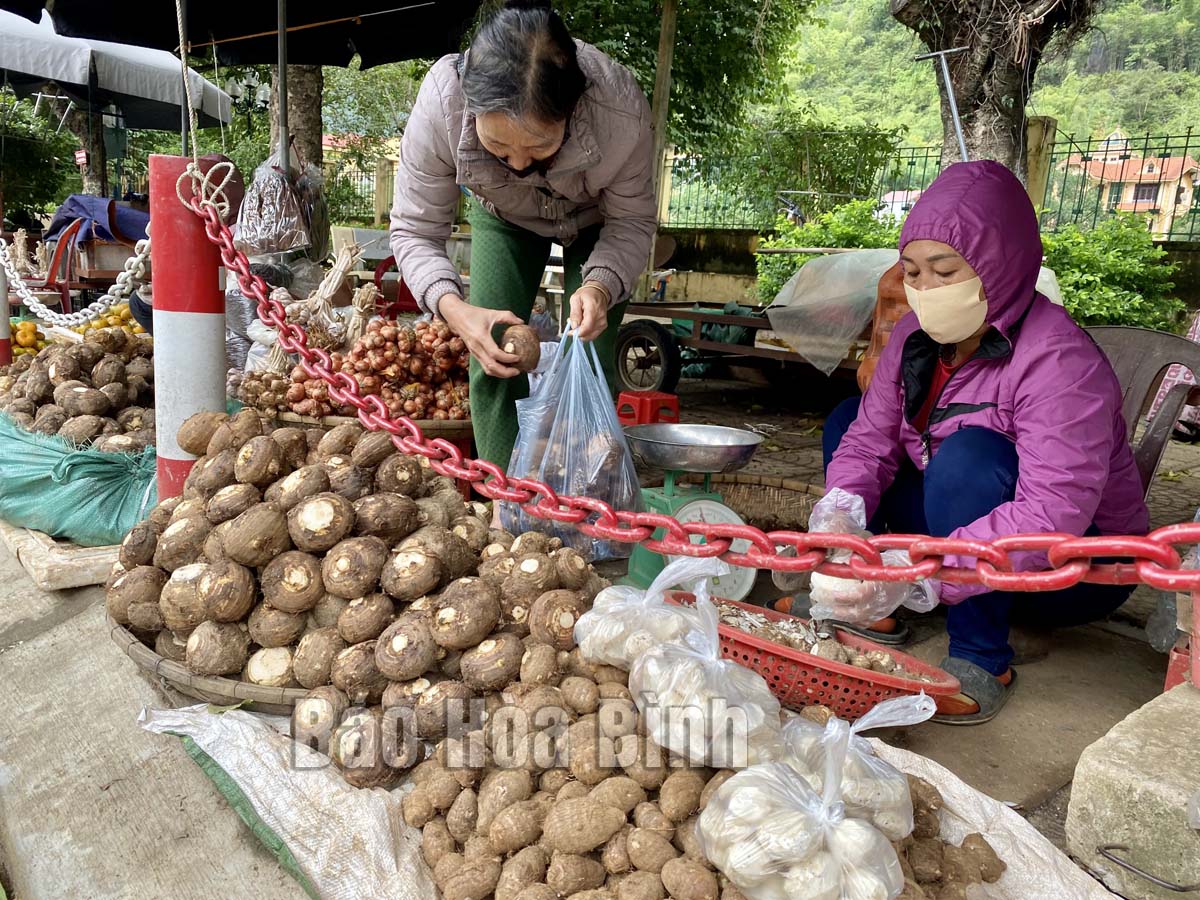
(HBO) – The year-end marks the harvesting season of Phuc San small taro in Mai Chau district. The specialty has increasingly well-known thanks to its good quality.

Phuc San taro put up for sale in a market in Mai Chau town.
Ha Thi Thoan, a local trader, has sold Phuc San
taro for many years in a market in Mai Chau town. She said taro put up for sale
must be carefully selected and cleaned to attract customers. Many have bought
Phuc San taro for their families and as a gift.
Customers often flock to Mai Chau at in weekends
to buy Phuc San Taro. Nguyen Thi Minh Thuong from Hanoi said she has enjoyed
the specialty for many times, and other members of her family like taro when it
is cooked with pork ribs or duck.
like her friends, Thuong bought up to 40kg of
taro for her family, relatives and friends during the trip.
According to Tran Manh Tan, deputy head of the
district's Bureau of Agriculture and Rural Development, Phuc San taro has made
its name in the market. As compared with taro grown in other localities, Phuc
San taro is bigger and has better quality thanks to favourable weather and soil
conditions.
This year, farmers in former Phuc San commune
(now Son Thuy commune) has maintained an area of 40ha of taro, with each ha
yielding about 18-20 tonnes. Notably, the product has an origin-tracing stamp,
helping to increase its competitiveness in the market.
With a limited output, Phuc San taro is mainly
sold in the Mai Chau town market, stores selling specialties in Hoa Binh city,
and a number of stores in Hanoi.
This year, Phuc San taro is sold at prices
ranging from 23,000 - 25,000 VND per kg. It has been harvested from
mid-October, and would be sold out in mid-December.
Through tourism and services, the product has
become increasingly popular among consumers nationwide.
Hoa Binh province is undergoing a dynamic transformation amid Vietnam’s national digital transition. Building on Poliburo’s Resolution No. 57-NQ/TW on breakthroughs in science, technology, innovation, and national digital transformation, the province has rolled out a wide range of practical action plans. A standout initiative is the "Digital Literacy for All” movement, an effort to ensure that no one is left behind in the digital era.
Hoa Binh province is undergoing a dynamic transformation in the wake of the national digital transformation movement. Building on Resolution No. 57-NQ/TW of the Politburo on breakthroughs in science, technology, innovation, and national digital transformation, the province has implemented a wide range of practical action plans. A standout initiative is the "Digital Literacy for All” movement ambitious effort to ensure that no one is left behind in the digital age.
With a spirit of unity and proactive problem-solving, the Party Committee, the government and the people of Dong Lai Commune (Tan Lac District) have made great strides in implementing the resolutions of the 24th Party Congress of the commune for the 2020 - 2025 term. Focusing on leadership and practical actions, the commune has brought the Party’s resolutions into daily life, creating strong impacts and pushing the local development forward.
Amid the nationwide push for digital transformation, young people in Hoa Binh Province are stepping up as dynamic pioneers, applying technology to enhance Youth Union operations and expand the reach of youth-led initiatives. Through creativity and adaptability, Youth Union organizations at all levels have introduced a series of practical solutions, contributing to modern governance and community development.
In recent years, An Nghia commune, located in Lac Son district, has stepped up administrative reform, focusing on improving the quality and efficiency of its single-window service unit for receiving and processing administrative procedures. These improvements have helped create favourable conditions for local residents and organisations to handle administrative procedures, contributing to the commune’s broader socio-economic development.
The Prime Minister-approved master plan to develop the multi-use value of forests ecosystems through 2030, with a vision to 2050, aims to improve the management and sustainable use of forest resources, create jobs, increase incomes, and improve the living standards of ethnic minorities, people in mountainous and remote areas, forest workers and those living near forests.



